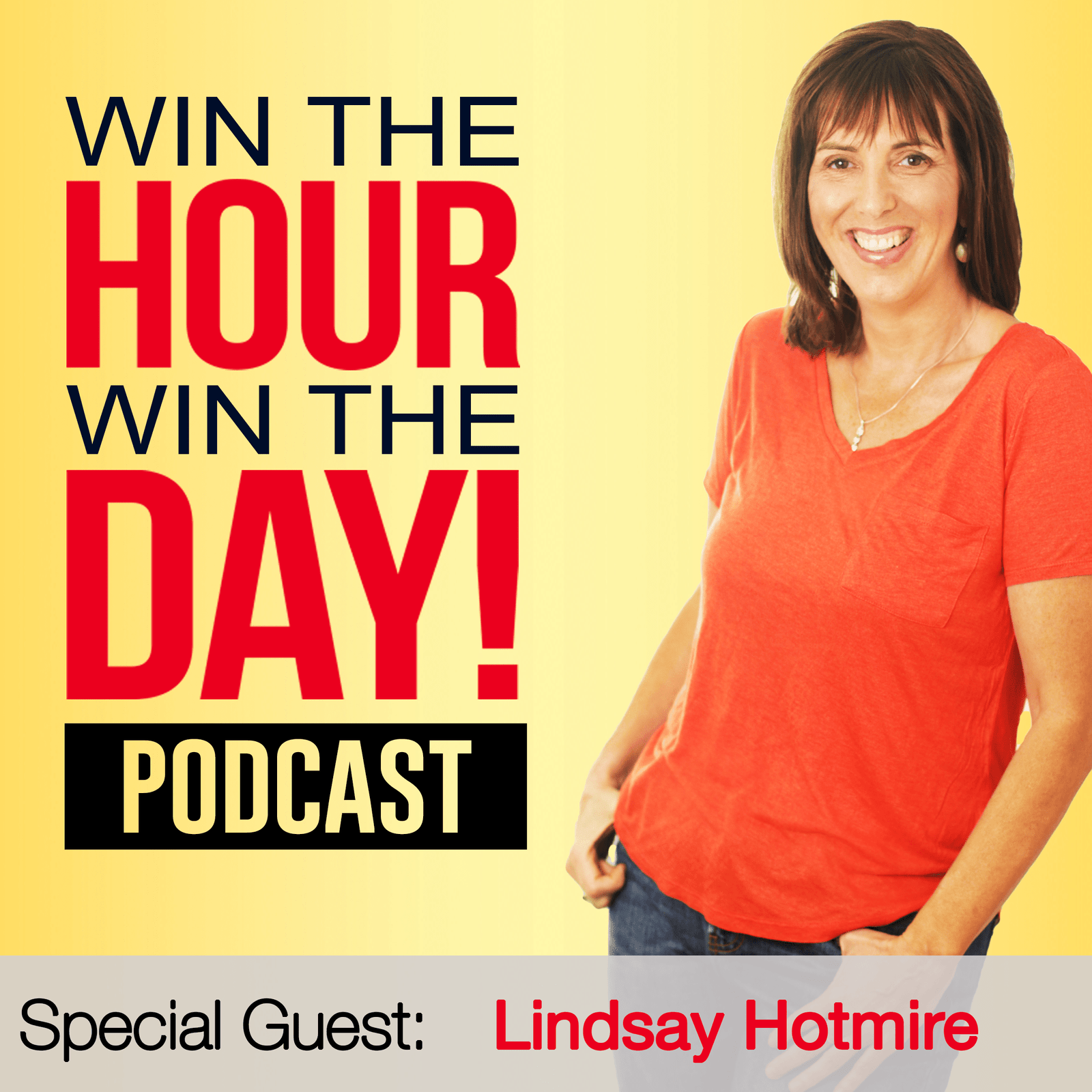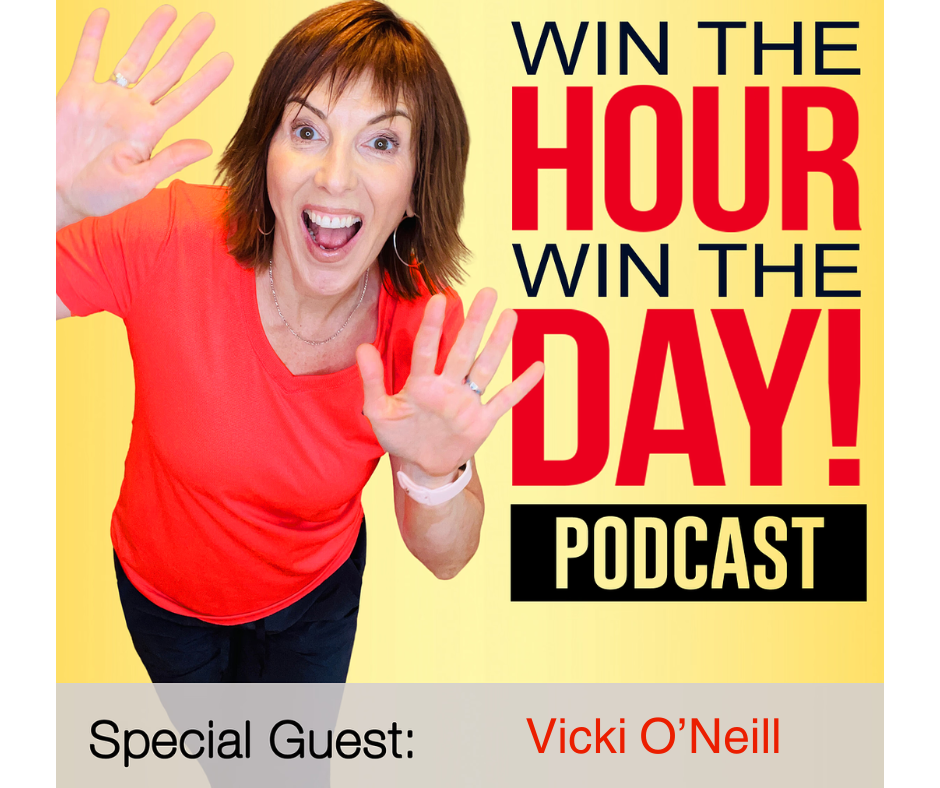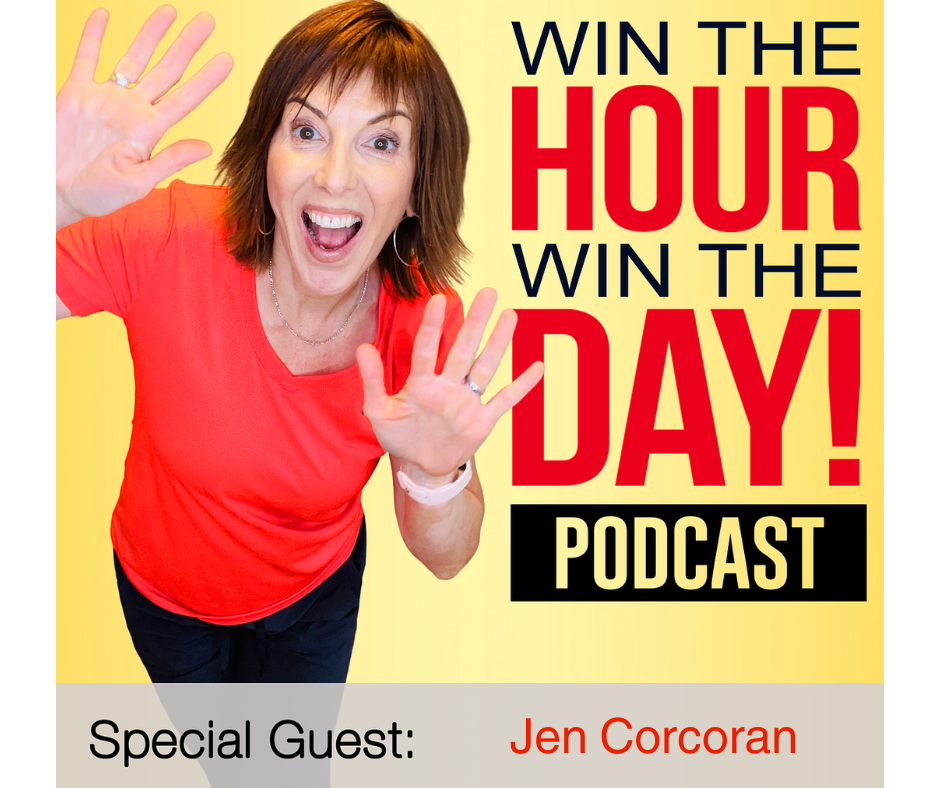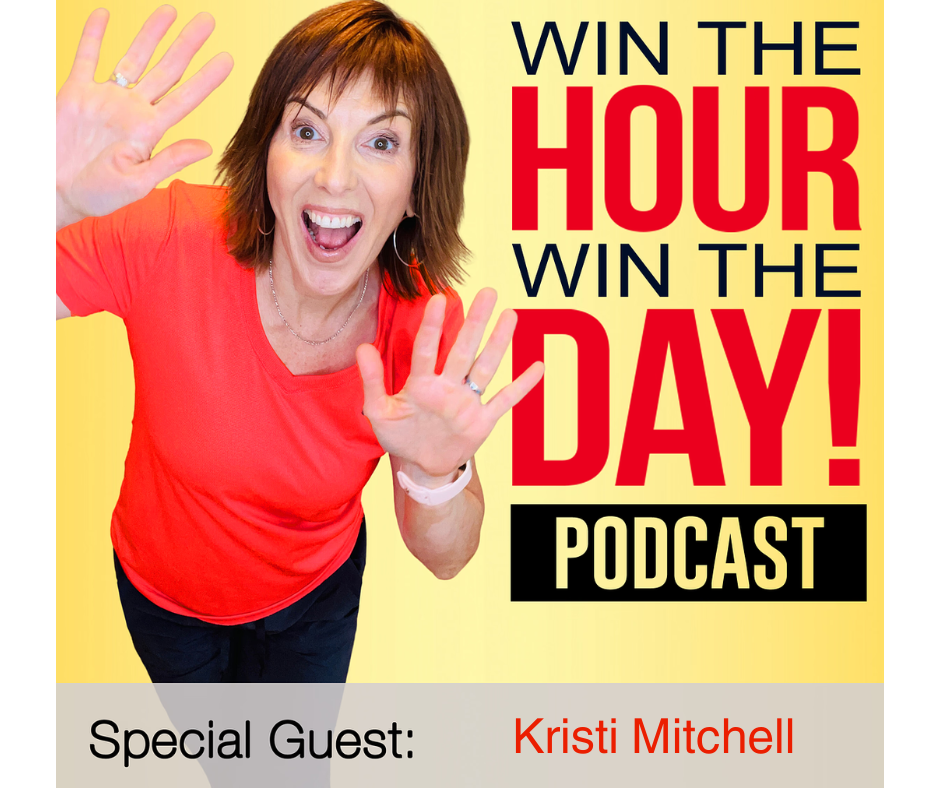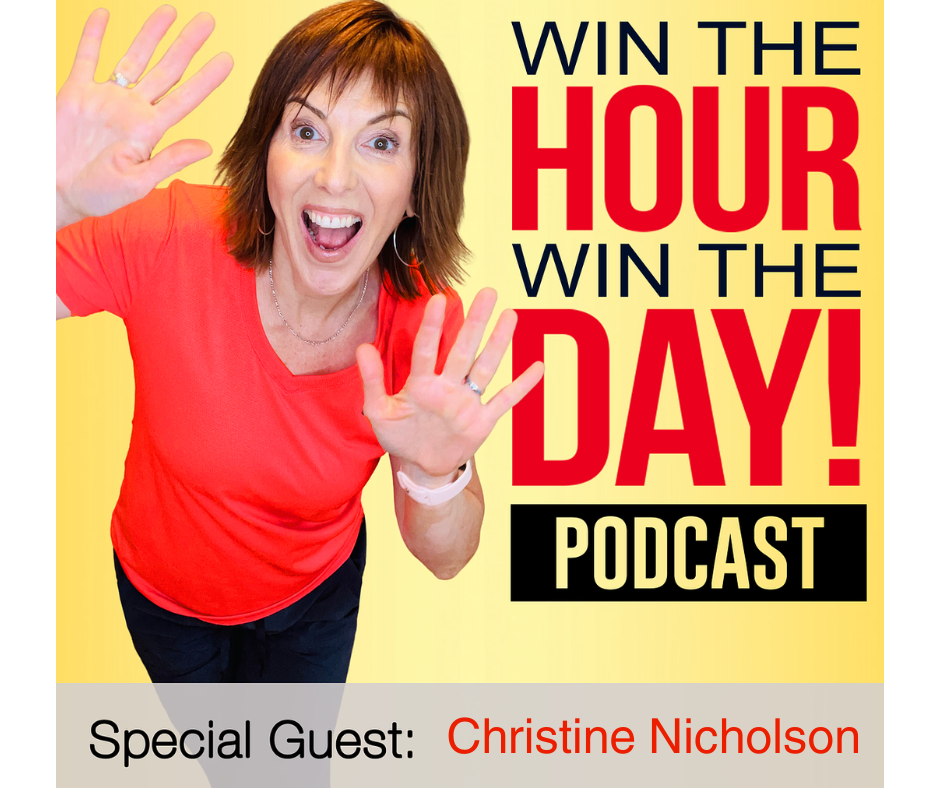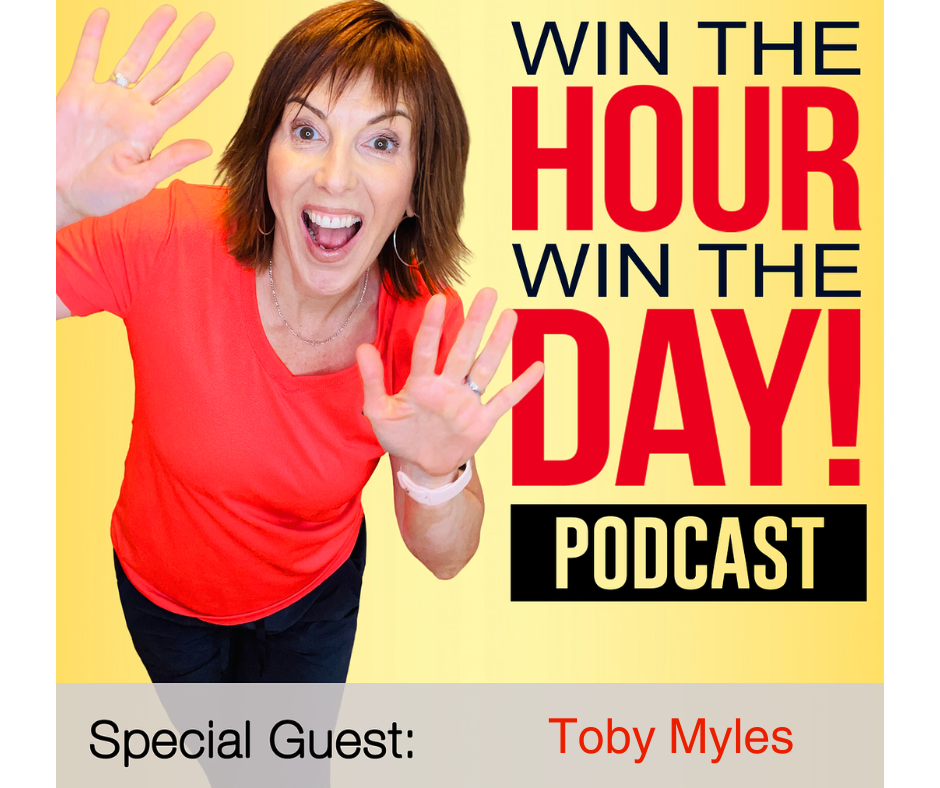Episode Summary
Lindsay Hotmire talks to us about brand storytelling! Listen in as she explains the importance of brand storytelling and why you shouldn’t overlook it!
Learn:
-why brand storytelling is important to your authority building
-how to be an effective brand storyteller
-why brand storytelling is crucial to your brand and your business.
And so much more!
Win The Hour, Win The Day Winners Circle
https://winthehourwintheday.com/winners-circle-masterclass
Win The Hour, Win The Day! www.winthehourwintheday.com
Podcast: Win The Hour, Win The Day Podcast
Facebook: https://www.facebook.com/winthehourwintheday/
LinkedIn: https://www.linkedin.com/company/win-the-hour-win-the-day-podcast
You can find Lindsay Hotmire at:
Website: https://lindsayhotmire.com/
Email: hello@lindsayhotmire.com
LinkedIn: https://www.linkedin.com/in/lindsayhotmire/
Win The Hour Win The Day
https://winthehourwintheday.com
Lindsay Hotmire Podcast Transcription
START[00:16:59]Kris Ward: Hey, everyone. Welcome to another episode of Win The Hour, Win The Day. I am your host, Kris Ward, and today in the house, we have Lindsay Hotmire. She is here to talk to us about brand storytelling. Now, you know how I am guys, we’re going to dive in. We’re going to give you some tactical takeaways. So let’s welcome her to the show. Lindsay, thanks for coming.
[00:17:21]Lindsay Hotmire: Thanks so much for having me so glad to be here.
[00:17:23]Kris Ward: Okay. All right. Well, we’re no fluff big results here, so let’s just dive in. Where do you want to start Lindsey?
[00:17:30]Lindsay Hotmire: Oh, goodness. Yeah, totally diving in. So yeah. So for me, you know, this concept of brand storytelling is such a big, almost real personal deal to me, just because…
[00:17:43] I’m just kind of goofy when it comes to the power of story, and what that does for us. Just not as, not just as business owners, but as human beings and how it can connect us and really serve as the bridge between us. And so that’s why my focus is on brand storytelling and really helping business owners tell their brand stories in a way that is going to connect them to their audience, because I feel like that’s really where the magic happens when we’re able to build and create those connections. And so when I stepped into..
[00:18:18]Kris Ward: So let me just jump in there for one sec. When we started off like that, I know for the rest of us, you’re like, ah, you know, so you almost start thinking like I have to present myself in a certain way and there’s something else I have to do.
[00:18:29] Right. And I know I struggled with that for years, because as I’ve said, many times on this show, I felt like, excuse me, that there was a way, like, you put your shoulders back and you want to be professional. So then you say, tell your story, okay, let me revise this to the professional version of Kris, but I just want to reiterate.
[00:18:46] I know for me, even though I know this, you always think this doesn’t apply to yourself. How many times have you been? I don’t know, scrolling or flipping through the channels. It’s Olympic time or something. You’re watching the Olympics and there’s some sport on you’re. Like, I don’t even know what this is called.
[00:18:59] What are they trying to do? Why are they upside down? And then they cut to 2 minutes of the interview with them and their father and all of a sudden you’re like, oh my gosh, he’s doing it for his dad. I hope he wins. I wouldn’t even know what the name of this sport is. So we know that storytelling gets us pulled in as human beings.
[00:19:16] But I think for me, anyhow, I always saw, well, that’s different. That’s not me. And it’s not business. Right. So that’s what we’re really going to tap into here is how to really make that work for you.
[00:19:29]Lindsay Hotmire: Right. Yeah. And I think that you kind of hit the nail on the head as you talk about that. And one of the things I’ve seen as I’ve worked with clients is that tension of this kind of business mindset and everything that we are told and that we’re taught from a business perspective on how to grow and scale our businesses.
[00:19:47] And so we get kind of trapped in this formulaic framework driven way of thinking. And so we wind up. Sanitizing our stories. Maybe?
[00:19:58]Kris Ward: It’s a good word. Yeah.
[00:20:00]Lindsay Hotmire: Yeah. Instead of really diving deep into kind of the muck and mire of who we are as human beings and realizing that actually does show up in our business and usually that’s okay.
[00:20:11] Like we don’t have to shy away from the tension. We don’t have to shy away from the flawed parts of our own humanity and our own stories. And so in order to tell your story well, in a way that’s really effective, and that’s really true and that is truly going to connect you to your audience.
[00:20:29] I tell my clients to focus really on three things like this. It is kind of the overarching approach that we focus on that buzz word authenticity. And we talk about alignment, which is ‘how does your story align and connect you to the actual audience that you should be serving?’ And then the authority piece.
[00:20:51] How do you use your story to build your authority? And that’s the model. It’s authenticity first, then alignment then authority. And what I find is that so often, we almost invert that model and we focus first on that authority piece. Then, we think about our audience. Then we think about ourselves and it needs to be flipped. We need to front load that story with the true understanding of who we are, doing that deep, messy.
[00:21:22]Kris Ward: Let me jump in, in case you hear me laughing, people, the reason I’m laughing I’m actually in my mind as you talk, I think, okay. How can we get through authority? I want to hear about alignment.
[00:21:30] Like I really was in my mind. Yeah, yeah, yeah. Authority. Let’s skip that and get, like, I knew I had to ask you that, but I’m like, okay, let’s make that quick and get onto the real stuff. Right. And then you say, we often flip that in her mind. I’m like, oh, well I’m doing that right now, Lindsay, is that a problem?
[00:21:48]Lindsay Hotmire: It can be a problem, especially when you haven’t really nailed your brand story down ever, and you haven’t really felt like you’ve gotten it to a point that helps you draw that true connection. And so that becomes the problem because then you build your business, you build your message, you build whatever, you know, whether it’s your offers, your messaging, whatever. You built that based on these external factors.
[00:22:13] Based on what are my competitors doing? Or where do I want to be five years from now? Or what are my mentors and the experts telling me to do? And sometimes I’ll use the analogy of it’s like we’re running a race in somebody else’s shoes. You told me earlier, you’re a runner, so you’ll get this.
[00:22:33] So it’s like if you were training for a race and some expert comes and says, ‘Hey, Kris, I’m a marathon runner and you can run just like I do the same time that I run. All you have to do is take this pair of shoes that I ran my last marathon in. You take it, you put them on and you’ll run. Just like I do.’
[00:22:54] Like you understand the futility in that, right? You try to run in somebody else’s shoes. You’re going to have bruises and blisters and shin splints, and it’s going to be miserable. And so that’s a lot of times what’s happening to us as business owners is we put on other people’s shoes expecting the same results.
[00:23:12] And when we fall and falter, we assume the problem is us. And that’s why business failure rates are so great. Right. We assume the problem is us. And so we quit long before we should, instead of figuring out. How to put on our own pair of shoes and how to run a brace in a way that works for us.
[00:23:31]Kris Ward: You bring them some really good points and you know what, here, I throw some things in here and I’m trying to keep this moving because I don’t want to get off too many different things.
[00:23:38] But I know for me in the beginning, when the “Win The Hour” really came out, because I had, I’m a marketing strategist by trade and been doing that for a really long time. And then as I explain to you, my audience knows, you know, my husband passed away. I’ve been pulled away from my business for a couple of years and nobody knew about that.
[00:23:55] And I returned and they were all shocked. Like how did I manage it? And they started coming to me, asking them if I could work with them under, you know, that capacity and it sort of snowballed from there. And so when I wrote my book thinking, how can I help more people? Of course, they kept saying to me, Kris, you got to tell your story.
[00:24:09] You got to tell what had happened there. And I kept saying, oh my gosh, first of all, I by nature in the past have been chronically private. My husband said when I started my business, he said, cause I used to say, if we run into somebody, Hey, why didn’t you tell them whatever I’m like, they don’t need to know my business.
[00:24:24] So he said, okay, I’m fine with you starting a business, but do you know, people have to start, they have to know your business. If you’re going to start a business and you can’t go around and say, they don’t need to know my business anymore. Right. So. And then when it came back, I was like, oh my gosh, I didn’t want that to define him or me.
[00:24:40] I didn’t want that to be a big, powerful thing. So everyone kept saying no, otherwise you’re just this efficiency productivity per you have to explain how this evolved. I’m like, okay, fine. So finally I listened and I don’t know if this is part of the journey, but it was just horrendous because it wasn’t about it being sad or that was painful for me.
[00:25:02] Anything. I just, again, I just didn’t want that to be the only thing that people knew about me. I didn’t want it to tug on that sympathy sleeve, and I guess it’s all in the delivery, but so in the beginning I would tell the story and well, it was horrendous. I remember the first podcast, actually. I just danced around the subject, but I wouldn’t say what happened to him.
[00:25:21] I just said, oh, he was giving him a grim diagnosis. And she just told me afterwards, we can’t air it this way. So I’m like, okay, I have to own up and whatever. So I guess it was becoming uncomfortable with it. And she was lovely. She let me redo it again. But this whole idea of you thinking you’re being authentic.
[00:25:34] You wouldn’t get up to be inauthentic so, I don’t know if people were pushing me to do it before I was ready or just had to muck it up a few times and then I was better with it. So I don’t know where we begin and end with that authenticity. Cause I find that kind of like a misnomer, like who would be inauthentic?
[00:25:52]Lindsay Hotmire: Right, right. Yeah. I think that authenticity is a misnomer. I don’t think that we have the time to dig into that, but you know, like we often equate authenticity with good people and the truth of the matter is a really bad jerk can be an authentic person. Like if they’re being true, they are and who they are.
[00:26:12] I wonder if they’re being authentic. Authenticity for me really boils down to these four concepts. And it’s based on the research of two psychologists in the early two thousands who were really kind of the first to dig into this idea of authenticity this way. And, you know, since then it’s become this huge buzz word.
[00:26:32] Which I don’t think is a coincidence. When you think about the fracturedness of our society, social media, that’s really driving us further apart than what it is bringing us together and we’re searching into what does it mean to be human? What does it mean to be connected? Like we talk a lot about the things that we don’t quite know how to grasp and to own.
[00:26:51] And so I, from a philosophical discussion, I think that’s why we’re hearing this word so often, you know, what does it mean to be authentic? Because we long to connect to ourselves and to one another, but Curtis and Goldman and analyzing that question talked about authenticity in a way then I took their research and created something that I call the authenticity flywheel.
[00:27:18] And what that is is if you want to be somebody who is consistently authentic, you have to first start with owning and understanding what your values are, what your true core deep values are. The values that completely set you apart from somebody else, the values that aren’t going to shift and change, no matter what it is you’re going to go through, what are those four values?
[00:27:40] And then the next piece is action. And so it’s one thing to claim and talk about your values. It’s another thing to live them out. And so you have to put those values under the microscope and make sure that these are really things that I’m living out no matter what I’m going to always live
[00:27:57] out these values. That’s where we saw a lot of brands throughout the last 18 months, get themselves into trouble. Right. They claimed values and then people started calling them out and saying, wait a minute, this isn’t who you are. And so we saw that tension. The next piece is, relationships or the next piece is honesty.
[00:28:17] Sorry. The last piece is relationships. So how honest am I about the values that I claim to own about the assumptions and the biases that I have about myself, my audience, my world, how honest am I actually being? And that takes a step back and being willing to be humble and reflective and honest with yourself, and having hard conversations so that you can really assess am I really living out my values in an honest, unbiased way?
[00:28:52]Kris Ward: I think for me too, there’s been a lot of growth when I realized, you know, we get confused when we put stuff out in social media. It’s almost like back in the day, you’re in a boardroom with the office and you stand up like, oh, I have to present something. That’s how I saw it. It’s like, oh, I’m presenting something to this group of professionals and I’m going to try to look professional.
[00:29:11] And so I saw myself as a different version of Kris, the professional Kris, which is just different from the Kris that visits grandma. Like, you know, it’s not night and day, you know, I’m not, it’s not an extreme gap, but it is a different gap. And so then when you really just getting up there as if I would be talking, not at you, but to you.
[00:29:30] And if we’re joking, like we were before we started this interview, that’s the person that needs to be out there versus the one that, you know, I feel like, oh, I’ll start off professional. And then once we get to know each other, it’s like the fifth day we become more connected and then you really get to see who I am.
[00:29:44] So really, I guess if there’s any takeaway, what authenticity is, you just are who you are and not to varying degrees sort of turning the volume up or down, I guess, really.
[00:29:55]Lindsay Hotmire: Right. And that what you were just saying, speaks to the last piece of the flywheel, which is relationships. And the question is, am I inviting open, honest, sincere relationships?
[00:30:05] And so what that looks like in different settings is going to vary. And so you might look in at that and think, gosh, I’m being inauthentic, cause the way I’m acting with person A is different than B, but that’s all life experience teaching us, right? That’s going to look different. They’re going to get different versions of Kris.
[00:30:24] My in-laws get different versions of Lindsey than what my family gets. They see different, but, but I’m not being inauthentic. It’s about struggling with that tension of relationship and what’s safe, what’s appropriate. What makes sense here. And so when we take ourselves through that flywheel in our businesses and with our audience, we should, we should get a story that emerges as well.
[00:30:48] That helps us kind of shoot ourselves out of that flywheel in a way that allows us to make connections, but allows us to do it in a way that actually is aligned with who we are.
[00:31:01]Kris Ward: Yeah, which I think as we move on to alignment, I think what the reality is, is there was a way in the previous way of thinking, I guess before social media was such a force in our lives of, you know, again, how you present yourself, but now it’s just like, this is it.
[00:31:16] You know, people want to know, like, and trust you and you are, I don’t care who you are. You are the brand, you, everything is about you. People are going to work with you just like back in the day when you had a job, it’s like, oh yeah, Kris is great to work with. Or, oh, she’ll get that done. You know, she said, she’d get it done.
[00:31:31] It’s going to be done. And so you want that same reputation, you know, throughout any and the other process. So it’s really, that’s the consistency there. Right. All right. So alignment, tell us a little bit about this.
[00:31:43]Lindsay Hotmire: Yeah, so alignment, you know, this is something that I think I took for granted when I first stepped into business to help other business owners do this piece.
[00:31:53] The number of people that don’t actually have conversations with their audience is astounding. Like when is the last time that you actually checked in with your audience and had a conversation, whether it was not just through a quantitative survey, but through those qualitative conversations where you’re getting, you know, one-on-one feedback that you can really dive in deep and get to the
[00:32:15] the essence of their experience with you as a brand. And so, one of the mental pictures I like to use is that of a mountaintop journey. And if you imagine that you’re at the bottom of the mountain and there’s this long path, and there’s, you know, an ocean between you and the mountain and at the top of the mountain is your audience.
[00:32:32] You’ve got to think about, ‘what does that journey need to look like for me to be able to just get to the mountain, to begin with?’ And then once I get to the top of the mountain, what is it that I’m going, what does my audience need to hear and see from me in order to be convinced to follow me back down?
[00:32:48] So you can’t, there’s a lot of us just kind of standing at the bottom of the mountain. The screaming up, just thinking that our presence alone, our expertise alone is going to be enough to convince our audience to come down off of that mountain. But they’re hungry. They’re tired. They’re afraid. We don’t know how they even got up to the top of the mountain.
[00:33:08] We don’t know what kind of physical limitations they may have to get off of that mountain. Like we have to have a very distinct and deep understanding of who they are in order to convince them to come back down with us.
[00:33:23]Kris Ward: That’s a good one. I like that. That’s a powerful visual and we all know about mountains in the entrepreneurial world, but you’re right.
[00:33:29] Like, okay, how do I negotiate that? Do I really know what they need and want to say, come on this journey with me? That’s a good one. All right. That makes sense. And does that lean itself into authority?
[00:33:41]Lindsay Hotmire: Absolutely because, you know, as I was saying, we often think, well, you know, I’ve gotten my vehicle to get me on the path to the mountain.
[00:33:52] I put all the things in my backpack to sustain me on my journey. And so when I meet my audience, all I need to do, it’s like that God and Moses moment, all I need to do is show up as the burning Bush and they’ll be convinced to follow me wherever I call them. And that’s not how it works. Like there are so many other experts along, you know, on the path with you, you know, by knocking you off the path, you know, vying for your audience, that it’s not enough to just
[00:34:21] show up and say, ‘Hey, I journeyed this path here. I have come down.’ Like, they’re not wanting you because you’re an expert and they’re wanting you because you’re the guide, you’re a friend. And so how are you showing up for your audience as their guide, as their friend to convince them to come down?
[00:34:39] And you know, when I think about that for me, that’s like, one of my core values is: be a friend because when I think of being a friend, like, that’s you’re all a true friend, you’re all in, right? Like, you know what your friend needs before you don’t wait for your friend to tell you what they need. You don’t say, ‘Hey, you know, you just had surgery.
[00:35:00] Tell me if you need a meal.’ No, you show up at their door with the meal before they even ask for it. You’re relentless. You’re there for them and you do whatever you need to do in order to know and understand them. And when you show up like that, when you’re focused as a business owner more on being a friend than what it is as an expert, that’s when you start to see things, start to shift.
[00:35:25]Kris Ward: I think it’s interesting too, because as you were talking, I was thinking about authority. I think we all do this. You’re like, I got to show, we all struggle with, okay, how much do I know? And you know, what’s gonna make me different from somebody else. So you’re trying to, I guess, not out-talk your competitors, but talk as smart as them, if not above them.
[00:35:44] And I know for us recently, we’re just getting serious about YouTube. You know, please. I know I’m ashamed to say we’ve been neglecting here and haven’t been doing it in a strategic fashion. Right. So now it’s like, okay, doing some more, how to videos. And for me it was a real struggle because, you know, I was like, oh, well, how do I show these bigger concepts in a short little video?
[00:36:04] And then you know what? They don’t need that. It’s the stuff that’s so basic like that they’re struggling with burnout. They don’t even know the things that like let’s say level sick. I should be talking to them at level one. And I know that as a marketing strategist, when I help other people, it’s like, oh, you’re talking to your competitors, not to your audience, but you’re always still very human, very flawed.
[00:36:25] Or at least I am. And you put your shoulders back and you think, oh, let me show you at what point, like these credentials have, I can be your guide, but it’s kind of like, maybe I always use fitness as an example, because at some point we’ve all wanted to lose five or 10 pounds. So maybe it’s like, Hmm, I need to lose five or 10 pounds, but I don’t need an Olympic athlete trainer to get those five pounds off.
[00:36:47] Right. I just see somebody at a different level than that. So I think though, we all want to impress and be the expert. I think it throws us off because I think from what I’m learning from you, with your pacing and your beautiful layout of stories, Lindsey, which is wonderful. Cause you talk about stories.
[00:37:05] That mountain was very visual. I think what I’m saying is when you do those things, the authority falls into place. You will be the authority. You don’t have to, I heard a saying once, if you’re rich, smart or beautiful, you don’t have to tell somebody they’ll know. Right, right.
[00:37:21]Lindsay Hotmire: Absolutely. Yeah. And that’s why the inversion piece, you know, like, starting out. I think that we all do this. I know that I did. You know, when I first started my business, I looked at, you don’t know what the heck you’re doing. And so you’re tuning into the experts to people who can help you and you try to mold and model yourself based on what you’re seeing.
[00:37:43] And maybe that’s just part of the messy process as well, before you stumble and bloody up your knees and you realize, okay, the only way I’m going to actually make this work is if I build this around me because I’m the one, like I’m the cornerstone of my business. And so unless you really understand yourself as that cornerstone, and you really know what it is, what’s it going to take to keep you strong, to keep you
[00:38:10] nourished to keep you in, you know, one solid piece, if you don’t know that and even more so if you’re not willing to honor it, then that’s when things start to crumble and all those beautiful other blocks that you put into place, they’re not going to stand because they were built on something that wasn’t quite right.
[00:38:29]Kris Ward: Yeah, a hundred percent. Well, we have just, it’s been Storytime here, win the hour, win the day, and it’s been helpful and impactful Lindsay, where can people find more of your excellence?
[00:38:40]Lindsay Hotmire: Yeah, so they can find me at my website, lindsayhotmire.com. There’s a downloadable piece that they can get. And it’s just about finding your brand story and just three tools that help you dig deep and really kind of tell it in a way that is authentic to you.
[00:38:57] It takes you through three exercises that aren’t typical. And just helps you look a little more deeply at who you are and how that connects to what you’re doing.
[00:39:08]Kris Ward: Yeah. I think again, as we wrap up, I think it’s really, I think it’s powerful stuff. And it often gets overlooked. I know, even for me, like, I’m sure I said to you when we first started talking about this.
[00:39:19] Okay. But my audience needs tangible takeaways. Like we have to dive in, I don’t want this whole vague brand and brand conversation. Right. But I think the way you laid it out today just reminds me how subtle but powerful it is and how easy it is to overlook, but how damaging it can be if we were rushing to the next phase.
[00:39:38]Lindsay Hotmire: Absolutely. Absolutely.
[00:39:39]Kris Ward: Fabulous. Fabulous. All right. We will see the rest of you in the next episode, and thank you so much for you wisdom and, uh, some, some powerful things to think about Lindsey. We appreciate you.
[00:39:49]Lindsay Hotmire: Thanks so much for having me.
END[00:39:51]

